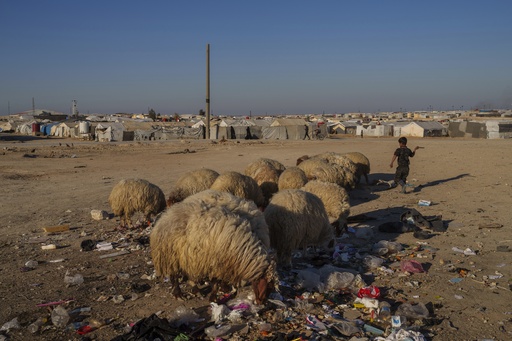AL-HOL, Syria — Ahmad Abdullah Hammoud feels fortunate to have managed to stockpile some food for his family. They, along with 37,000 people — primarily women and children, are enduring another phase of hardship at the al-Hol tent camp in northeastern Syria. This camp has become a temporary home for those with alleged connections to the Islamic State group, where living conditions have deteriorated significantly. The recent cessation of aid from a U.S.-backed organization has led to further chaos and uncertainty within the already dire humanitarian environment.
Human rights advocates have long highlighted the camp’s challenging conditions, marked by violence and unsanitary surroundings. The site primarily shelters the wives and children of IS fighters along with those who support the extremist group. After the announcement of the aid freeze right after the Trump administration took office, many global aid programs began rolling back their services. This included Blumont, the organization previously managing essential supplies in al-Hol, which operates under the U.S.-led coalition aimed at dismantling IS.
Blumont’s brief withdrawal prompted apprehension among residents. Hammoud, who denies any association with IS, spoke of his struggles, saying food supplies have dwindled. Other residents echoed his sentiments, reporting that even bread became a rare commodity, typically arriving only late in the afternoon. Jihan Hanan, the camp director, confirmed that various aid agencies, including the World Health Organization, had also pulled back some of their operations.
“This is a disgraceful decision,” Hanan stated, criticizing the actions taken by the Trump administration. Some camp residents have demanded the right to leave the site if food shortages continue. According to Hanan, Blumont had been supplying around 5,000 bags of bread each day, but local authorities in the Kurdish-controlled region lack the funds to replace this support.
The future remains uncertain for the camp residents. Hanan noted that Blumont was granted a temporary waiver to resume limited operations but its long-term status is unclear. Mazloum Abdi, commander of the Syrian Democratic Forces governing the area, mentioned that he has raised concerns regarding the aid freeze with officials in the U.S.-led coalition, adding that a possible exemption for northeastern Syria may be in consideration.
The aid suspension arrives amidst fears that IS could exploit the weakened security situation following recent government shifts in the region. Hanan warned that further reductions in food aid could trigger unrest among residents, which IS might attempt to manipulate. She shared that there were warnings from multiple security entities about potential attacks on the camp, leading to increased security measures.
The al-Hol camp houses a mix of individuals; approximately 16,000 Iraqis and 15,000 Syrians occupy the main area, while an adjacent, tightly secured section called the Annex holds around 6,300 individuals from 42 different nations, primarily consisting of supporters and relatives of IS. Living conditions are grim, with no paved pathways and litter strewn about the encampment. Children and teenagers often find little to occupy their time, resorting to makeshift games or wandering aimlessly.
A resident from the Annex, a Chinese woman named Asmaa Ahmad, spoke about her circumstances. Identifying her husband as a “martyr” who died for IS, she voiced her reluctance to return to China due to fears of persecution. Concerning the recent cut in U.S. assistance, she stated, “Sustenance is from God,” expressing hope that her family would one day be rescued by IS members.
Underlining the risks of children growing up potentially indoctrinated by extremist ideologies, Hanan emphasized that the al-Hol camp is an unsuitable environment for youth. The U.S. military has been advocating for nations to repatriate their citizens held within al-Hol and the nearby Roj Camp to prevent the development of future extremism. General Michael Erik Kurilla, head of U.S. Central Command, has voiced concern that without repatriations and rehabilitation efforts, these camps present a real risk of breeding the next generation of ISIS affiliates.
Some Syrians within the camp have expressed a desire to return home since the regime changes. Hanan announced that any Syrian wishing to leave would be permitted to do so. However, she cautioned that even a smaller camp population would encounter disastrous conditions if U.S. aid were to be suspended again.




